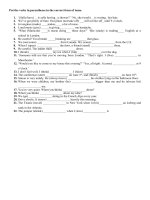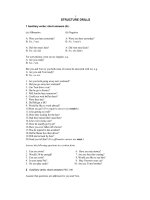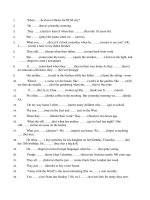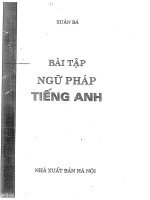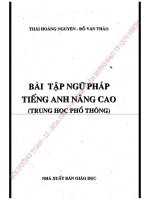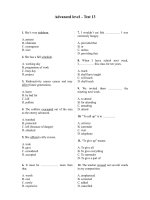Bài tập ngữ pháp tiếng anh nâng cao luyện thi Toeic và đại học (Advance)
Bạn đang xem bản rút gọn của tài liệu. Xem và tải ngay bản đầy đủ của tài liệu tại đây (339.75 KB, 36 trang )
A1
GrammarNet
Gramática da Língua Inglesa
www.grammarnet.com
Inversion in Conditionals
Using subject-verb inversion, rewrite the sentences without changing the meaning of the
sentences printed before them.
Example:
If you were to interview the Prime Minister, what would you ask?
Were you to interview the Prime Minister, what would you ask?
1. If you happen to go to the computer shop, please buy me a box of CDs.
...................................................................................................................................
2. If the government were to spend more money on health, the quality of service in
hospitals would improve.
...................................................................................................................................
3. If he insists on pressing charges against you, you should hire a lawyer.
...................................................................................................................................
4. If you are not satisfied with our product, we will refund you the money.
...................................................................................................................................
5. If you need further information, please do not hesitate to contact us.
...................................................................................................................................
6. If he doesn’t resign, new measures will have to be taken.
...................................................................................................................................
7. If he hadn’t embezzled €1,000 from the company, he wouldn’t be in jail right now.
...................................................................................................................................
8. If you should see Mr Smith on Monday, please inform him of the situation.
...................................................................................................................................
9. If this new policy were implemented, a storm of protest would be expected.
...................................................................................................................................
10. If I had known earlier, I would have taken the children to school.
...................................................................................................................................
10
© E.S.Ping 2007
1 of 2
aexe1.pdf
A1
GrammarNet
Gramática da Língua Inglesa
www.grammarnet.com
Inversion in Conditionals
Using subject-verb inversion, rewrite the sentences without changing the meaning of the
sentences printed before them.
Example:
If you were to interview the Prime Minister, what would you ask?
Were you to interview the Prime Minister, what would you ask?
1. If you happen to go to the computer shop, please buy me a box of CDs.
Should you happen to go to the computer shop, please buy me a box of CDs.
2. If the government were to spend more money on health, the quality of service in
hospitals would improve.
Were the government to spend more money on health, the quality of service in
hospitals would improve.
3. If he insists on pressing charges against you, you should hire a lawyer.
Should he insist on pressing charges against you, you should hire a lawyer.
4. If you are not satisfied with our product, we will refund you the money.
Should you not be satisfied with our product, we will refund you the money.
5. If you need further information, please do not hesitate to contact us.
Should you need further information, please do not hesitate to contact us.
6. If he doesn’t resign, new measures will have to be taken.
Should he not resign, new measures will have to be taken.
7. If he hadn’t embezzled €1,000 from the company, he wouldn’t be in jail right now.
Had he not embezzled €1,000 from the company, he wouldn’t be in jail right now.
8. If you should see Mr Smith on Monday, please inform him of the situation.
Should you see Mr Smith on Monday, please inform him of the situation.
9. If this new policy were implemented, a storm of protest would be expected.
Were this new policy to be implemented, a storm of protest would be expected.
10. If I had known earlier, I would have taken the children to school.
Had I known earlier, I would have taken the children to school.
10
© E.S.Ping 2007
2 of 2
aexe1.pdf
A2
GrammarNet
Gramática da Língua Inglesa
www.grammarnet.com
Inversion in Conditionals
Using subject-verb inversion, rewrite the sentences without changing the meaning of the
sentences printed before them.
Example:
If you were to interview the Prime Minister, what would you ask?
Were you to interview the Prime Minister, what would you ask?
1. If I had known how difficult the job was going to be, I would never have accepted it.
...................................................................................................................................
2. If the river floods, a lot of people will have to be evacuated.
...................................................................................................................................
3. If he were elected Prime Minister, would he do a better job than his predecessor?
...................................................................................................................................
4. If she had known how troublesome the boy would be, she would never have agreed to
look after him.
...................................................................................................................................
5. If you don’t tell the truth, people will not trust you.
...................................................................................................................................
6. If he decides to leave his wife, what will he do with his children?
...................................................................................................................................
7. If I had been told you were coming, I would have picked you up at the airport.
...................................................................................................................................
8. If you were sent to Italy to work, would you accept the job?
...................................................................................................................................
9. If he has the right qualifications, I am sure they will offer him the job.
...................................................................................................................................
10. If she had set out early, she wouldn’t have been caught in the traffic jam.
...................................................................................................................................
10
© E.S.Ping 2007
1 of 2
aexe2.pdf
A2
GrammarNet
Gramática da Língua Inglesa
www.grammarnet.com
Inversion in Conditionals
Using subject-verb inversion, rewrite the sentences without changing the meaning of the
sentences printed before them.
Example:
If you were to interview the Prime Minister, what would you ask?
Were you to interview the Prime Minister, what would you ask?
1. If I had known how difficult the job was going to be, I would never have accepted it.
Had I known how difficult the job was going to be, I would never have accepted it.
2. If the river floods, a lot of people will have to be evacuated.
Should the river flood, a lot of people will have to be evacuated.
3. If he were elected Prime Minister, would he do a better job than his predecessor?
Were he to be elected Prime Minister, would he do a better job than his predecessor?
4. If she had known how troublesome the boy would be, she would never have agreed to
look after him.
Had she known how troublesome the boy would be, she would never have agreed to
look after him.
5. If you don’t tell the truth, people will not trust you.
Should you not tell the truth, people will not trust you.
6. If he decides to leave his wife, what will he do with his children?
Should he decide to leave his wife, what will he do with his children?
7. If I had been told you were coming, I would have picked you up at the airport.
Had I been told you were coming, I would have picked you up at the airport.
8. If you were sent to Italy to work, would you accept the job?
Were you to be sent to Italy to work, would you accept the job?
9. If he has the right qualifications, I am sure they will offer him the job.
Should he have the right qualifications, I am sure they will offer him the job.
10. If she had set out early, she wouldn’t have been caught in the traffic jam.
Had she set out early, she wouldn’t have been caught in the traffic jam.
10
© E.S.Ping 2007
2 of 2
aexe2.pdf
A3
GrammarNet
Gramática da Língua Inglesa
www.grammarnet.com
Inversion in Conditionals
Using subject-verb inversion, rewrite the sentences without changing the meaning of the
sentences printed before them.
Example:
If you were to interview the Prime Minister, what would you ask?
Were you to interview the Prime Minister, what would you ask?
1. If you see John, please give him my best regards.
...................................................................................................................................
2. If you were to earn a huge salary, what would you do with the money?
...................................................................................................................................
3. If he hadn’t squandered all his savings, he wouldn’t be poor now.
...................................................................................................................................
4. If she were to get wind of the situation, she would definitely be devastated.
...................................................................................................................................
5. If you need assistance, please let us know.
...................................................................................................................................
6. If he is accepted for the job, he will go out and celebrate.
...................................................................................................................................
7. If I hadn’t chosen to learn English, I wouldn’t be doing this exercise right now.
...................................................................................................................................
8. If it hadn’t been so strange, I would have remembered it.
...................................................................................................................................
9. If I were in your shoes, I would tell her the truth.
...................................................................................................................................
10. If he were promoted, his salary would double.
...................................................................................................................................
10
© E.S.Ping 2007
1 of 2
aexe3.pdf
A3
GrammarNet
Gramática da Língua Inglesa
www.grammarnet.com
Inversion in Conditionals
Using subject-verb inversion, rewrite the sentences without changing the meaning of the
sentences printed before them.
Example:
If you were to interview the Prime Minister, what would you ask?
Were you to interview the Prime Minister, what would you ask?
1. If you see John, please give him my best regards.
Should you see John, please give him my best regards.
2. If you were to earn a huge salary, what would you do with the money?
Were you to earn a huge salary, what would you do with the money?
3. If he hadn’t squandered all his savings, he wouldn’t be poor now.
Had he not squandered all his savings, he wouldn’t be poor now.
4. If she were to get wind of the situation, she would definitely be devastated.
Were she to get wind of the situation, she would definitely be devastated.
5. If you need assistance, please let us know.
Should you need assistance, please let us know.
6. If he is accepted for the job, he will go out and celebrate.
Should he be accepted for the job, he will go out and celebrate.
7. If I hadn’t chosen to learn English, I wouldn’t be doing this exercise right now.
Had I not chosen to learn English, I wouldn’t be doing this exercise right now.
8. If it hadn’t been so strange, I would have remembered it.
Had it not been so strange, I would have remembered it.
9. If I were in your shoes, I would tell her the truth.
Were I in your shoes, I would tell her the truth.
10. If he were promoted, his salary would double.
Were he to be promoted, his salary would double.
10
© E.S.Ping 2007
2 of 2
aexe3.pdf
A4
GrammarNet
Gramática da Língua Inglesa
www.grammarnet.com
Inversion for emphasis
Rewrite the following sentences beginning with the word given.
Example: I will never do that again.
Never will I do that again.
1.
He rarely goes to the theatre.
Rarely .....................................................................................................................
2.
I have never driven a tractor.
Never ......................................................................................................................
3.
She hardly ever studies.
Hardly .....................................................................................................................
4.
He had scarcely started eating when the phone rang.
Scarcely ..................................................................................................................
5.
He seldom went to the cinema.
Seldom ....................................................................................................................
6.
I had no idea that the man was armed.
Little .......................................................................................................................
7.
As soon as he got out of the car the police arrested him.
No sooner ................................................................................................................
8.
She must definitely not be allowed to use this computer.
On no account .........................................................................................................
9.
We could get the door open only by breaking the lock.
Only ........................................................................................................................
10. The exercise was so difficult that I couldn't answer half of the questions.
So ...........................................................................................................................
10
© E.S.Ping 2007
1 of 2
aexe4.pdf
A4
GrammarNet
Gramática da Língua Inglesa
www.grammarnet.com
Inversion for emphasis
Rewrite the following sentences beginning with the word given.
Example: I will never do that again.
Never will I do that again.
1.
He rarely goes to the theatre.
Rarely does he go to the theatre.
2.
I have never driven a tractor.
Never have I driven a tractor.
3.
She hardly ever studies.
Hardly ever does she study.
4.
He had scarcely started eating when the phone rang.
Scarcely had he started eating when the phone rang.
5.
He seldom went to the cinema.
Seldom did he go to the cinema.
6.
I had no idea that the man was armed.
Little did I know that the man was armed.
7.
As soon as he got out of the car the police arrested him.
No sooner had he got out of the car than the police arrested him.
8.
She must definitely not be allowed to use this computer.
On no account must she be allowed to use this computer.
9.
We could get the door open only by breaking the lock.
Only by breaking the lock could we get the door open.
10. The exercise was so difficult that I couldn't answer half of the questions.
So difficult was the exercise that I couldn't answer half of the questions.
© E.S.Ping 2007
2 of 2
aexe4.pdf
A5
GrammarNet
Gramática da Língua Inglesa
www.grammarnet.com
Inversion for emphasis
Rewrite the following sentences beginning with the word given.
Example: I will never do that again.
Never will I do that again.
1.
It was the first time the house had been broken into.
Never ......................................................................................................................
2.
Buffaloes are hardly seen in the area.
Seldom ....................................................................................................................
3.
He must definitely not be promoted to general.
On no account .........................................................................................................
4.
The only way we could get in touch with him was by using the mobile phone.
Only ........................................................................................................................
5.
He had no idea where he was.
Little .......................................................................................................................
6.
As soon as the lesson finished the students rushed out of the classroom.
No sooner ................................................................................................................
7.
She had only just arrived home when the phone rang.
Hardly .....................................................................................................................
8.
Yesterday was so hot that I had to drink a lot of water.
So ...........................................................................................................................
9.
He seldom leaves the house.
Seldom ....................................................................................................................
10. He was so intelligent that he solved the problem in a matter of minutes.
Such ........................................................................................................................
10
© E.S.Ping 2007
1 of 2
aexe5.pdf
A5
GrammarNet
Gramática da Língua Inglesa
www.grammarnet.com
Inversion for emphasis
Rewrite the following sentences beginning with the word given.
Example: I will never do that again.
Never will I do that again.
1.
It was the first time the house had been broken into.
Never before had the house been broken into.
2.
Buffaloes are hardly seen in the area.
Seldom are buffaloes seen in the area.
3.
He must definitely not be promoted to general.
On no account must he be promoted to general.
4.
The only way we could get in touch with him was by using the mobile phone.
Only by using the mobile phone could we get in touch with him.
5.
He had no idea where he was.
Little did he know where he was.
6.
As soon as the lesson finished the students rushed out of the classroom.
No sooner had the lesson finished than the students rushed out of the classroom.
7.
She had only just arrived home when the phone rang.
Hardly had she arrived home when the phone rang.
8.
Yesterday was so hot that I had to drink a lot of water.
So hot was yesterday that I had to drink a lot of water.
9.
He seldom leaves the house.
Seldom does he leave the house.
10. He was so intelligent that he solved the problem in a matter of minutes.
Such was his intelligence that he solved the problem in a matter of minutes.
© E.S.Ping 2007
2 of 2
aexe5.pdf
A6
GrammarNet
Gramática da Língua Inglesa
www.grammarnet.com
Sentence Transformation
Complete each of the sentences in such a way that it means exactly the same as the
sentence printed before it.
1.
John seemed to be very polite.
John gave ................................................................................................................
2.
Jane did not finish her work until midnight.
It was ......................................................................................................................
3.
I had better go home now.
It is time ..................................................................................................................
4.
As soon as he arrived home, he had a shower.
No sooner ................................................................................................................
5.
Although she liked children very much, she couldn't face them any more that day.
Much ......................................................................................................................
6.
They were interested in nothing except talking about football.
Talking about football .............................................................................................
7.
Although we played well, we lost the game.
In spite ....................................................................................................................
8.
Mary was never late for work.
At no time ...............................................................................................................
9.
Very few people are willing to accept this job.
Hardly .....................................................................................................................
10. She did not hesitate to ask for more money.
She had ...................................................................................................................
10
© E.S.Ping 2007
1 of 2
aexe6.pdf
A6
GrammarNet
Gramática da Língua Inglesa
www.grammarnet.com
Sentence Transformation
Complete each of the sentences in such a way that it means exactly the same as the
sentence printed before it.
1.
John seemed to be very polite.
John gave the impression of being (or that he was) very polite.
2.
Jane did not finish her work until midnight.
It was not until midnight that (or midnight before) Jane finished her work.
3.
I had better go home now.
It is time I went home (or for me to go home).
4.
As soon as he arrived home, he had a shower.
No sooner had he arrived home than he had a shower.
5.
Although she liked children very much, she couldn't face them any more that day.
Much as (or though) she liked children, she couldn't face them any more that day.
6.
They were interested in nothing except talking about football.
Talking about football was all (or the only thing) they were interested in.
7.
Although we played well, we lost the game.
In spite of the fact that we played well, we lost the game.
8.
Mary was never late for work.
At no time was Mary late for work.
9.
Very few people are willing to accept this job.
Hardly anyone (or anybody) is willing to accept this job.
10. She did not hesitate to ask for more money.
She had no hesitation in asking for more money.
© E.S.Ping 2007
2 of 2
aexe6.pdf
A7
GrammarNet.com
Gramática da Língua Inglesa
Irregular Verbs
Write the irregular verbs in the Past Simple and Past Participle.
Infinitive
Past Simple
Past Participle
bend
bleed
breed
burst
cling
creep
dig
draw
flee
fling
grind
kneel
lead
saw
seek
sew
sow
spit
spread
strive
swing
weave
weep
wind
wring
50
© E.S.Ping 2010
1 of 2
aexe7.pdf
A7
GrammarNet.com
Gramática da Língua Inglesa
Irregular Verbs
Write the irregular verbs in the Past Simple and Past Participle.
Infinitive
Past Simple
Past Participle
bend
bent
bent
bleed
bled
bled
breed
bred
bred
burst
burst
burst
cling
clung
clung
creep
crept
crept
dig
dug
dug
draw
drew
drawn
flee
fled
fled
fling
flung
flung
grind
ground
ground
kneel
knelt
knelt
lead
led
led
saw
sawed
sawn
seek
sought
sought
sew
sewed
sewn
sow
sowed
sown
spit
spat
spat
spread
spread
spread
strive
strove
striven
swing
swung
swung
weave
wove
woven
weep
wept
wept
wind
wound
wound
wring
wrung
wrung
© E.S.Ping 2010
2 of 2
aexe7.pdf
A8
GrammarNet.com
Gramática da Língua Inglesa
British v. American Spelling
Write the words in British English.
NOTE:
(1) = verb
(2) = air or beer
(3) = unit of measurement
(4) = noun
American
British
American
airplane
aluminum
anesthesia
analog
ax
analyze
behavior
anesthetic
calisthenics
appall
center
archeologist
check
(4)
armory
color
checkerboard
disk
counselor
enroll
defense
gage
diarrhea
gotten
donut
gynecology
draft (2)
humor
encyclopedia
installment
fetus
insure
gray
jewelry
homeopathy
kidnaping
licorice
labeled
meter (3)
labor
pajamas
license (4)
program
likable
sulfur
liter
theater
plow
practice
British
thru
(1)
tire (4)
50
© E.S.Ping 2010
1 of 2
aexe8.pdf
A8
GrammarNet.com
Gramática da Língua Inglesa
British v. American Spelling
Write the words in British English.
NOTE:
(1) = verb
(2) = air or beer
(3) = unit of measurement
(4) = noun
American
British
American
British
airplane
aeroplane
aluminum
aluminium
anesthesia
anaesthesia
analog
analogue
ax
axe
analyze
analyse
behavior
behaviour
anesthetic
anaesthetic
calisthenics
callisthenics
appall
appal
center
centre
archeologist
archaeologist
cheque
armory
armoury
color
colour
checkerboard
chequerboard
disk
disc
counselor
counsellor
enroll
enrol
defense
defence
gage
gauge
diarrhea
diarrhoea
gotten
got
donut
doughnut
check
(4)
(2)
gynecology
gynaecology
draft
humor
humour
encyclopedia
encyclopaedia
installment
instalment
fetus
foetus
insure
ensure
gray
grey
jewelry
jewellery
homeopathy
homoeopathy
kidnaping
kidnapping
licorice
liquorice
(3)
draught
labeled
labelled
meter
labor
labour
pajamas
pyjamas
license (4)
licence
program
programme
likable
likeable
sulfur
sulphur
liter
litre
theater
theatre
plough
thru
through
plow
practice
(1)
© E.S.Ping 2010
practise
tire
2 of 2
(4)
metre
tyre
aexe8.pdf
A9
GrammarNet.com
Gramática da Língua Inglesa
Homophones
Write the homophones.
Examples: our hour
see sea
Homophones
Homophones
allowed
find
bare
flower
be
guessed
blue
guilt
bore
hall
bored
heard
bough
higher
boy
hole
break
horse
by
idol
calendar
in
caught
key
cereal
lane
course
lay
cruise
least
days
led
dear
made
die
fair
main
feet
maize
40
© E.S.Ping 2010
1 of 2
aexe9.pdf
A9
GrammarNet.com
Gramática da Língua Inglesa
Homophones
Write the homophones.
Examples: our hour
see sea
Homophones
Homophones
allowed
aloud
find
fined
bare
bear
flower
flour
be
bee
guessed
guest
blue
blew
guilt
gilt
bore
boar
hall
haul
bored
board
heard
herd
bough
bow
higher
hire
boy
buoy
hole
whole
break
brake
horse
hoarse
by
bye
idol
idle
calendar
calender
in
inn
caught
court
key
quay
cereal
serial
lane
lain
course
coarse
lay
ley
cruise
crews
least
leased
days
daze
led
lead (metal)
dear
deer
made
maid
die
dye
male
fair
fare
main
mane
feet
feat
maize
maze
© E.S.Ping 2010
2 of 2
aexe9.pdf
A10
GrammarNet.com
Gramática da Língua Inglesa
Homophones
Write the homophones.
Examples: be
in
bee
inn
Homophones
Homophones
mall
pea
manner
peace
meet
peel
might
peer
minor
phrase
moat
pie
morning
place
muscle
plane
new
pole
night
pour
nob
prays
nose
principal
not
queue
one
rain
ore
raise
our
red
paced
rhyme
pain
ring
pair
road
past
role
40
© E.S.Ping 2010
1 of 2
aexe10.pdf
A10
GrammarNet.com
Gramática da Língua Inglesa
Homophones
Write the homophones.
Examples: be
in
bee
inn
Homophones
Homophones
mall
maul
pea
pee
manner
manor
peace
piece
meet
meat
peel
peal
might
mite
peer
pier
minor
miner
phrase
frays
moat
mote
pie
pi
morning
mourning
place
plaice
muscle
mussel
plane
plain
new
knew
pole
poll
night
knight
pour
pore
nob
knob
prays
preys, praise
nose
knows
principal
principle
not
knot
queue
cue
one
won
rain
rein, reign
ore
oar
raise
rays, raze
our
hour
red
read (past)
paced
paste
rhyme
rime
pain
pane
ring
wring
pair
pear, pare
road
rode, rowed
past
passed
role
roll
© E.S.Ping 2010
2 of 2
aexe10.pdf
A11
GrammarNet.com
Gramática da Língua Inglesa
Homophones
Write the homophones.
Examples: be
in
bee
inn
Homophones
Homophones
rough
source
route
stair
row
steak
sack
steal
sail
story
see
straight
seen
style
sell
suite
sent
sun
sewn
sure
sheer
tail
side
tax
sight
threw
sign
tire
site
war
slay
way
so
weather
sole
week
sore
where
sort
write
40
© E.S.Ping 2010
1 of 2
aexe11.pdf
A11
GrammarNet.com
Gramática da Língua Inglesa
Homophones
Write the homophones.
Examples: be
in
bee
inn
Homophones
Homophones
rough
ruff
source
sauce
route
root
stair
stare
row
roe
steak
stake
sack
sac
steal
steel
sail
sale
story
storey
see
sea
straight
strait
seen
scene
style
stile
sell
cell
suite
sweet
sent
scent, cent
sun
son
sewn
sown
sure
shore
sheer
shear
tail
tale
side
sighed
tax
tacks
sight
site, cite
threw
through
sign
sine
tire
tyre
site
sight
war
wore
slay
sleigh
way
weigh
so
sew, sow
weather
whether
sole
soul
week
weak
sore
soar, saw
where
wear, ware
sort
sought
write
right, rite
© E.S.Ping 2010
2 of 2
aexe11.pdf
A12
GrammarNet.com
Gramática da Língua Inglesa
Collective Nouns
Complete the expressions with the following collective nouns: army, array, bevy, body,
bunch, bundle, cloud, company, contingent, crew, crop, crowd, deck, fleet, flight, flock,
gang, heap, herd, kindle, pack, panel, pile, school, swarm, team, throng.
Collective Nouns
Collective Nouns
a ……………………… of clothes
a ……………………… of sailors
a ……………………… of people
a ……………………… of apples
a ……………………… of mosquitoes
a ……………………… of players
a ……………………… of elephants
a ……………………… of sticks
a ……………………… of beautiful girls
a ……………………… of sheep
a ……………………… of thieves
a ……………………… of bananas
a ……………………… of students
a ……………………… of men
a ……………………… of judges
a ……………………… of pack animals
an ……………………… of ants
a ……………………… of cards
a ……………………… of stairs
a ……………………… of papers
a ……………………… of ships
a ……………………… of horses
a ……………………… of bees
an ……………………… of facts
a ……………………… of flowers
a ……………………… of oxen
a ……………………… of birds
a ……………………… of swine
a ……………………… of wolves
a ……………………… of lies
a ……………………… of keys
a ……………………… of buses
a ……………………… of tourists
a ……………………… of kittens
a ……………………… of researchers
a ……………………… of swallows
a ……………………… of elks
a ……………………… of whales
a ……………………… of soldiers
a ……………………… of hounds
40
© E.S.Ping 2010
1 of 2
aexe12.pdf
A12
GrammarNet.com
Gramática da Língua Inglesa
Collective Nouns
Complete the expressions with the following collective nouns: army, array, bevy, body,
bunch, bundle, cloud, company, contingent, crew, crop, crowd, deck, fleet, flight, flock,
gang, heap, herd, kindle, pack, panel, pile, school, swarm, team, throng.
Collective Nouns
Collective Nouns
a bundle / heap of clothes
a crew of sailors
a crowd of people
a crop of apples
a cloud of mosquitoes
a company of players
a herd of elephants
a bundle of sticks
a bevy of beautiful girls
a flock of sheep
a pack / gang of thieves
a bunch of bananas
a crop of students
a body of men
a panel of judges
a herd of pack animals
an army of ants
a deck of cards
a flight of stairs
a pile of papers
a fleet of ships
a team of horses
a swarm of bees
an array of facts
a bunch of flowers
a team of oxen
a flock of birds
a herd of swine
a pack of wolves
a pack of lies
a bunch of keys
a fleet of buses
a flock / throng of tourists
a kindle of kittens
a team of researchers
a flight of swallows
a gang of elks
a school of whales
a contingent of soldiers
a pack of hounds
© E.S.Ping 2010
2 of 2
aexe12.pdf
A13
GrammarNet.com
Gramática da Língua Inglesa
Collective Nouns
Complete the expressions with the following collective nouns: batch, battalion, battery,
board, circle, clump, cluster, colony, constellation, covey, drove, gaggle, host, legion,
litter, mass, mob, murder, muster, phalanx, pod, pride, ring, set, shoal, sloth, string,
suite, troop, wad, watch.
Collective Nouns
Collective Nouns
a ……………………… of crows
a ……………………… of puppies
a ……………………… of friends
a ……………………… of nightingales
a ……………………… of onions
a ……………………… of admirers
a ……………………… of photographers a ……………………… of geese
a ……………………… of hooligans
a ……………………… of lions
a ……………………… of bears
a ……………………… of recruits
a ……………………… of riot police
a ……………………… of ants
a ……………………… of stars
a ……………………… of pearls
a ……………………… of seals
a ……………………… of peacocks
a ……………………… of schoolgirls
a ……………………… of directors
a ……………………… of letters
a ……………………… of dolphins
a ……………………… of rules
a ……………………… of sightseers
a ……………………… of bank notes
a ……………………… of film stars
a ……………………… of troops
a ……………………… of trees
a ……………………… of fish
a ……………………… of tests
a ……………………… of cattle
a ……………………… of accessories
a ……………………… of examiners
a ……………………… of cutlery
a ……………………… of whales
a ……………………… of partridges
a ……………………… of thieves
a ……………………… of spectators
a ……………………… of rooms
a ……………………… of monkeys
40
© E.S.Ping 2010
1 of 2
aexe13.pdf

